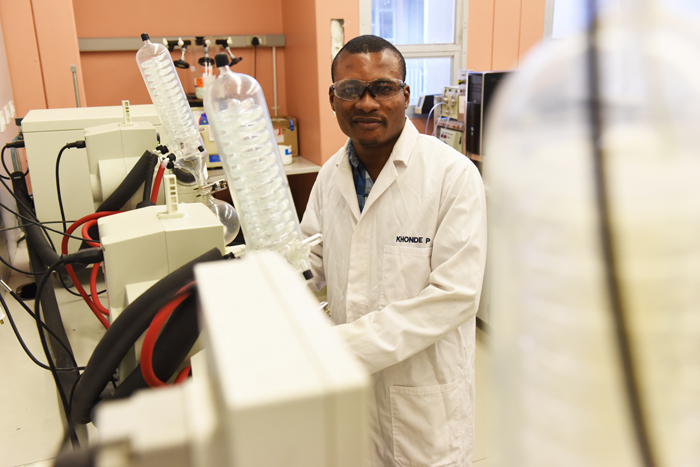Lutete Khonde: Synthesizing a super antioxidant
30 September 2016 | Story by Newsroom
Growing up in the DRC, Lutete Khonde had no idea that a decade later he would find himself in Cape Town, dedicating his PhD research to finding new ways of making ergothioneine.
Ergothioneine was first discovered a century ago when it was extracted in 1909 from a fungus known as ergot. It has only been in the last few decades, however, that scientists have become interested in the use of this amino acid within the human body.
Although the human body is incapable of producing the substance itself, it was discovered that our bodies contain a specific protein transporter for ergothioneine and that the substance is most prevalent in human skin, eyes, semen and kidneys.
Ergothioneine is now being studied all over the world for its antioxidant powers, its role in ageing and its ability to increase athletic performance. Its relationship to tuberculosis as a protectant of Mycobacterium tuberculosis against oxidative stress is of particular interest, as blocking the bacteria's own production of ergothioneine could be a novel way of designing anti-TB drugs.
'What do you do with chemistry?'
“When I announced I was doing chemistry at university, my family was quite shocked,” Khonde recalls. “My father is a judge and no one else in my family showed an interest in science. I remember my mother asking me, 'Lutete, what do you do with chemistry?” he recalls.
He was therefore happy to announce, two weeks before he graduated with distinction from the University of Kinshasa, that he had been offered a job with the international beer-brewing company Heineken. Khonde spent the next couple of years overseeing the installation of a new wastewater plant and creating a project to improve their laboratories.
After two years though, he grew bored. When his father suggested he accompany him on a trip to South Africa in 2010, Khonde agreed, visiting Cape Town and applying to UCT for his master's degree in the process.
Two years later, with his MSc in chemistry in hand, Khonde again had a decision to make – return home to Kinshasa and a job at Heineken or continue his studies with a PhD at UCT. He chose the latter.
Synthesizing a patent
“For my master's, I worked on creating a platform for the synthesis of key enzyme substrates involved in the biosynthesis of thiols in Mycobacterium tuberculosis,” Khonde explains, “but for my PhD, my supervisor, Dr Anwar Jardine, and I decided to look at the synthesis of ergothioneine since up until that point it was very difficult to extract it from natural sources, such as bacteria and mushrooms, or to synthesize it in a lab.”
which requires a lot of time and hard work,
then it must have an impact.
Your work must mean something in the world.”
Khonde discovered that there were three existing patents related to the synthesis of ergothioneine. He found all three to be almost impossible to reproduce. Instead, he created a new way of synthesizing this super antioxidant in a lab – one that was simpler, faster, cheaper and resulted in a much greater yield than previous processes.
“Finally my mom knows what you can use chemistry for,” Khonde says.
His process has now been patented and he is working with colleagues in the Department of Chemistry to find ways to bring the process to market.
“I believe that if you are going to do a PhD, which requires a lot of time and hard work, then it must have an impact. Your work must mean something in the world,” he says.
In the future, Khonde plans to remain in academia, where he thinks it is possible to balance the need to publish papers and get citations with a love of teaching and a desire to invent new ways of doing things that have practical uses.
“I think it is possible to strike a balance between these different motivations,” Khonde says. “If you listen to your own voice, find your vocation and work really hard, then anything is possible.”
Story Ambre Nicolson. Photo Michael Hammond.
 This work is licensed under a Creative Commons Attribution-NoDerivatives 4.0 International License.
This work is licensed under a Creative Commons Attribution-NoDerivatives 4.0 International License.
Please view the republishing articles page for more information.










